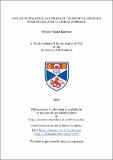A study of Malawian and Nigerian Pentecostal churches in Scotland : a sociological approach
Abstract
‘A Study of Malawian and Nigerian Pentecostal Churches in Scotland: A sociological Approach,’ provides a critical academic analysis of the emergence and continued proliferation of African Pentecostal Churches APCs in Scotland. The main objective of the research was to provide a critical analysis and synthesis of the emergence of the Malawian and Nigerian Pentecostal Churches in Scotland from the socioreligious and spiritual capital theories. The study contends that the contemporary expansion of African Christianity from the global South to the North was neither formal nor intentional as was the case in the 18th and 19th century movements, but rather informal and developing spontaneously across the western world. The study found that the APCs were popular amongst Africans in the diaspora because church membership provided a sense of identity and belonging as well as spiritual and social support mechanisms in newfound foreign lands. Therefore, the APCs become necessary socioreligious and spiritual capital. It was observed that the acceptance of African religiosity in the west shall take the form of spirited cultural exchange and mutual trust between the host communities and the African diaspora. However, the emergence and subsequent growth of the Malawian and Nigerian Pentecostal churches in Scotland cannot be construed as Christianity reversing to its former heartlands from the global South. The re-evangelisation in the western context demands a theological realignment suitable for multiculturalism toward a new global order in African Christianity.
Type
Thesis, PhD Doctor of Philosophy
Collections
Items in the St Andrews Research Repository are protected by copyright, with all rights reserved, unless otherwise indicated.

